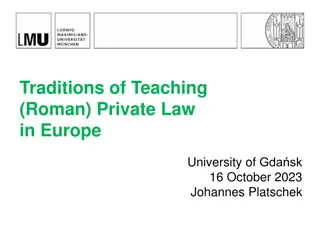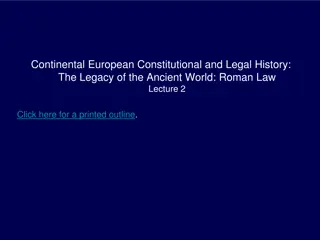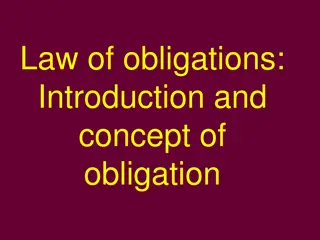Evolution of Property Transfer in Roman Law
Comparative Property Law explores the evolution of property transfer in Roman law. In classical Roman law, property transfer required an external act of delivery. Over time, formal acts like mancipatio and traditio became common for property transfer. During the Justinian period, traditio became the
3 views • 24 slides
Insights into the Plague: Epidemiology, Etiology, and Outbreaks
The Plague, caused by Yersinia pestis, has a chilling history spanning pandemics like the Justinian Plague and the Black Death. Understanding its etiology, family, and pathogenicity is crucial. This deadly disease has had notable outbreaks in India, emphasizing the importance of recognizing its host
0 views • 24 slides
Traditions of Teaching Roman Private Law in Europe
Explore the rich history and teaching traditions of Roman Private Law in Europe, starting from the Bolognese School of Glossators to the influential figures like Azo of Bologna. Discover how teaching methods like the Quaestiones Sabbatinae and the use of Justinian law books have shaped legal educati
0 views • 20 slides
Evolution of Roman Legal System and Justinian's Codification
Roman legal history is divided into several periods, from the Archaic City-State to the Classical Principate and the Post-Classical Dominate. The codification of Roman law culminated in Justinian's Corpus Iuris Civilis, which included the Digest, Institutes, Code, and Novels. Justinian's reforms est
0 views • 35 slides
Byzantine Empire and Eastern Orthodox Church Overview
The Byzantine Empire, also known as the Eastern Roman Empire, flourished from 330 CE to 1453 CE under Greek rule. It played a significant role in trade, politics, and culture during the Post-Classical Era, connecting trade routes and reconquering the West under rulers like Justinian. However, challe
0 views • 9 slides
Understanding the Concept of Obligations in Law
Introduction to the concept of obligations in law, exploring definitions by Paul and Justinian, development of obligations, legal relationships, equality of parties, and obligations in Roman law including actio suits and the origins of obligations in the Law of Twelve Tables.
1 views • 37 slides





